Book contents
- Frontmatter
- List of Contents
- Acknowledgements
- Introduction
- §1 Problem of the New
- §2 Problem of Relations
- §3 Problem of Emergence
- §4 Problem of One and Many
- §5 Plato and the Third Man Argument
- §6 Bradley and the Problem of Relations
- §7 Moore, Russell and the Birth of Analytic Philosophy
- §8 Russell and Deleuze on Leibniz
- §9 On Problematic Fields
- §10 Kant and Problematic Ideas
- §11 Armstrong and Lewis on the Problem of One and Many
- 12 Determinables and Determinates
- 13 The Limits of Representational Thought
- 14 Learning from a Cup of Coffee
- 15 Carnap and the Fate of Metaphysics
- 16 Truth and Relevance
- Conclusion
- Bibliography
- Index
Conclusion
Published online by Cambridge University Press: 25 October 2023
- Frontmatter
- List of Contents
- Acknowledgements
- Introduction
- §1 Problem of the New
- §2 Problem of Relations
- §3 Problem of Emergence
- §4 Problem of One and Many
- §5 Plato and the Third Man Argument
- §6 Bradley and the Problem of Relations
- §7 Moore, Russell and the Birth of Analytic Philosophy
- §8 Russell and Deleuze on Leibniz
- §9 On Problematic Fields
- §10 Kant and Problematic Ideas
- §11 Armstrong and Lewis on the Problem of One and Many
- 12 Determinables and Determinates
- 13 The Limits of Representational Thought
- 14 Learning from a Cup of Coffee
- 15 Carnap and the Fate of Metaphysics
- 16 Truth and Relevance
- Conclusion
- Bibliography
- Index
Summary
Let us return to where we began, with Kant's admission that philosophy ‘cannot, as other sciences, attain universal and lasting acclaim’ (Kant 2014, 5). With this recognition, Kant began a philosophical project that has dominated much of philosophy for the past two centuries – namely, the task of reconciling philosophical inquiry with the success of the sciences. As we traced the implications of these efforts, we honed in on two dominant trends, what I called the monist, Spinozist tendency, and the pluralist, Humean tendency. Both can be seen to be carrying forward important aspects of Kant's project. The Spinozist tendency, as we saw, recognises that there is a reality that accounts for but is not to be confused with anything determinate, such as natural laws, universals or Ideas. The problem this leaves us with is the problem of accounting for how the determinate comes to be conditioned by that which is not to be confused with it. The Humean tendency, by contrast, accepts the reality of diverse phenomena, a reality that is fundamentally determinate and discrete, whether these be Hume's impressions, Russell's particulars or Lewis’s singletons, among other examples we have discussed. The problem this leaves us with is accounting for the relationship between determinate phenomena, an account that Bradley argues ultimately leads us to a vicious regress which undermines the possibility of giving an account. The problems both tendencies lead to are exacerbated, I argued, by assuming that in the end an account must rely on something that is fundamentally determinate. It is this bias in favour of the primacy of the determinate that was challenged as I developed the arguments in favour of problematic Ideas.
Problematic Ideas entail the paradoxical tendency to be both dedifferentiating, and hence less and less differentiated to the point of becoming irreducible to anything determinate, and differentiating, or more and more differentiated as relationships become increasingly individuated. The primacy of the determinate largely adopts the latter approach, seeking to determine what is the case, locating the determinate reality that offers us an account and/or ends a regress.
- Type
- Chapter
- Information
- An Inquiry into Analytic-Continental MetaphysicsTruth, Relevance and Metaphysics, pp. 204 - 206Publisher: Edinburgh University PressPrint publication year: 2022

